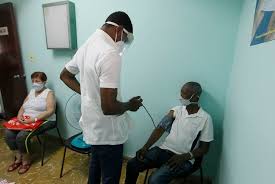Level of knowledge of students of Medical Sciences on the management of hypertensive emergency
DOI:
https://doi.org/10.5281/zenodo.15110126Keywords:
complications, hypertensive emergency, furosemide, serious, labetalol, target- organsAbstract
Introduction: The hypertensive emergency is a serious condition of high frequency that affects the patient´s quality of life and can cause deadly consequences.
Objectives: To determine the level of knowledge of a group of students of the Medical Sciences from Pinar del Rio on the management of the hypertensive emergency.
Methods: An observational, descriptive, cross-sectional study was carried out. The universe consisted of 39 students, and the entire universe was used. The variables used were: age, sex, definition of hypertensive emergency, complications of hypertensive emergency, management of hypertensive emergency, medications to treat hypertensive emergency, and level of knowledge on hypertensive emergency. Descriptive statistics was used.
Results: The female sex predominated (69.23%). The predominant age group was from 20 to 22 years old (43.58%). 71.79% defined the condition as an acute elevation of blood pressure above 180/110 mmHg with target- organ damage. Acute myocardial infarction was the most identified complication (84.61%). 84.61% identified that the goal of initial treatment is to quickly and partially reduce blood pressure to safe levels, not the complete correction fo it. For the pharmacological treatment, 61.53% identified the furosemide and labetalol.
Conclusions: Students of medical sciences show an optimal level of knowledge on the management of hypertensive emergencies. However, it is necessary to deepen into aspects related to their initial management and the medications used in emergency rooms.
References
Miguel Soca PE, Sarmiento Teruel Y. Hipertensión arterial, un enemigo peligroso. Acimed.2019 [citado 16/05/2020];20(3):92-100. Disponible en: http://scielo.sld.cu/scielo.php?script=sci_arttext&pid=S1024-94352009000900007&lng=es&nrm=iso&tlng=es
Sellén Crombet J, Sellén Sanchén E, Barroso Pacheco L, Sellén Sánchez S. Evaluación y diagnóstico de la Hipertensión Arterial. Rev Cubana Invest Bioméd. 2009[citado 16/05/2021];28(1). Disponible en: http://scielo.sld.cu/scielo.php?script=sci_arttext&pid=S0864-03002009000100001&lng=es
Morejón Giraldoni AF, Benet Rodríguez M, Bernal Muñoz JL, Espinosa Brito AD, Silva Aycaguer LC, Ordunez P. Factores relacionados con el control de la hipertensión arterial en Cienfuegos. Rev Cubana Salud Pública. 2019[citado 16/05/2021];45(3):1-17. Disponible en: https://scielosp.org/article/rcsp/2019.v45n3/e1716/#ModalArticles
Valero R, García Soriano A. Normas, consejos y clasificaciones sobre hipertensión arterial. Enferm Glob. 2018[citado 17/05/2021];(15). Disponible en: http://scielo.isciii.es/scielo.php?script=sci_arttext&pid=S1695-61412018000100012&lng=es
Weschenfelder Magrini D, Gue Martini J. Hipertensión arterial: principales factores de riesgo modificables en la estrategia salud de la familia. Enferm Glob. 2016[citado 17/05/2021];11(26): 344-353. Disponible en: https://scielo.isciii.es/scielo.php?script=sci_arttext&pid=S1695-61412012000200022
Ramos María V. Hipertensión arterial: novedades de las guías 2018. Rev Urug Cardiol.2019 [citado 25/05/2021];34(1):131-152. Disponible en: http://www.scielo.edu.uy/scielo.php?script=sci_arttext&pid=S1688-04202019000100131&lng=es
Layerle B, Vignolo W. Hipertensión arterial: hechos esenciales. Rev Urug Cardiol.2016[citado 16/05/2021];27(3):352-376. Disponible en: http://www.scielo.edu.uy/scielo.php?script=sci_arttext&pid=S1688-04202012000300016
Caldevilla Bernardo D, Martínez Pérez J, Artigao Rodenas LM, Divisón Garrote JA, Carbayo Herencia JA, Massó Orozco J. Crisis Hipertensiva. Rev Clin Med Fam.2008[citado 25/04/2021]; 2(5): 236-243. Disponible en: http://scielo.isciii.es/scielo.php?script=sci_arttext&pid=S1699-695X2008000300007&lng=es
Contreras F, Rivera M, de la Parte MA, Rodríguez S, Méndez O, Papapietro AK et al. Valoración del Paciente Hipertenso. RFM. 2016[citado 16/05/2020];23(1):11-18. Disponible en: http://ve.scielo.org/scielo.php?script=sci_arttext&pid=S0798-04692000000100003
Cuba. Ministerio de Salud Pública. Anuario Estadístico de Salud 2020.La Habana: MINSAP; 2021 [citado 08/05/2021]. Disponible en: http://files.sld.cu/bvscuba/files/2021/08/Anuario-Estadistico-Espa%c3%b1ol-2020-Definitivo.pdf
Fernández Morano LM, Leal Miras B. Conocimientos de los pacientes hipertensos sobre hipertensión arterial y riesgo cardiovascular que acuden a urgencias extrahospitalarias. VII Congreso Internacional Virtual Para Enfermería Y Fisioterapia;2016/06/03-10.Ciudad de Granada: Agencia de Calidad Sanitaria de Andalucía; 2016.Disponible en: http://congresoenfermeria.es/libros/2016/sala3/6612.pdf
Peña Sainz de la Masa J. Hipertensión arterial: estudio de conocimientos y adherencia terapéutica en población de Bilbao.[Tesis].[España]: Universidad Pública de Navarra;2014.40p. Disponible en: https://academica-e.unavarra.es/xmlui/bitstream/handle/2454/11277/JaionePe%c3%b1aSainzdelaMaza.pdf?sequence=1&isAllowed=y
Mejia Christian R, Quezada Osoria C, Moras Ventocilla C, Quinto Porras K, Ascencios Oyarce C. Nivel de conocimientos sobre emergencias médicas en estudiantes de medicina de universidades peruanas. Rev Perú Med Exp Salud Publica. 2011[citado 16/05/2021];28(2): 202-209. Disponible en: http://www.scielo.org.pe/scielo.php?script=sci_arttext&pid=S1726-46342011000200006&lng=es
Ramírez Bautista CD, Espinosa Alarcón P. Clinical competence in systemic arterial hypertension of undergraduate students at 2 schools of medicine. Rev Invest Clín. 2000;52(2): 132-139.
Reyes Jiménez NA. Nivel de conocimiento del personal médico sobre el manejo de la emergencia hipertensiva en el servicio de urgencias Primer Contacto del Hospital General de Zona 2, Tuxtla Gutiérrez. [México.D.F]: Universidad Nacional Autónoma de México; 2015. 66p. Disponible en: https://repositorio.unam.mx/contenidos/nivel-de-conocimiento-del-personal-medico-sobre-el-manejo-de-la-emergencia-hipertensiva-en-el-servicio-de-urgencias-pr-350576?c=jarGg1&d=false&q=Adriana&i=2&v=1&t=search_0&as=0

Published
How to Cite
Issue
Section
License
Copyright (c) 2021 Revista Estudiantil HolCien

This work is licensed under a Creative Commons Attribution-NonCommercial 4.0 International License.
Centro Provincial de Información de Ciencias Médicas. Universidad de Ciencias Médicas de Holguín. Cuba.
Política de acceso y distribución
El total de los artículos publicados son contribuciones de acceso abierto, que se distribuyen según los términos de la Licencia Creative Commons Atribución–NoComercial 4.0 que permite el uso, distribución y reproducción no comerciales y sin restricciones en cualquier medio, siempre que sea debidamente citada la fuente primaria de publicación.




